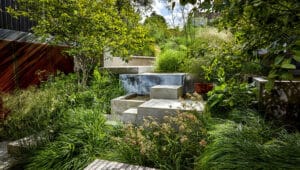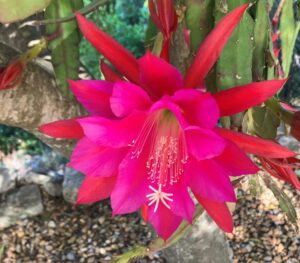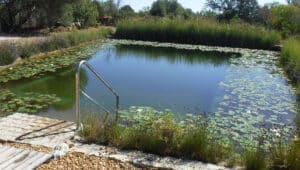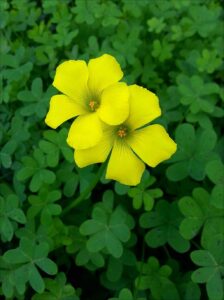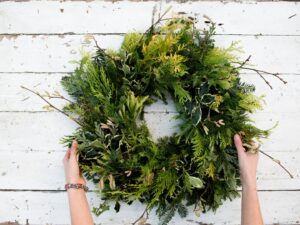By: STUART MERELIE
Stuart Merelie, landscaper, ecological researcher and permaculture fanatic, shares his passion for correct and sustainable landscaping in the Algarve and is our permanent garden and landscaping correspondent. This week is the ninth part in a series of 24 exploring Permaculture and its importance and uses in today’s world.
I MET my new hero last month. Standing barely five feet high with snake-like coils of hair wrapped around his face, and feet hardened by years without shoes – Nobsy is must see viewing.
He left his native Germany many moons ago and after travelling through India, settled in Sta Clara, next to the lake. After 20 years of growing his own food, studying the seasons, finding the best water supply, Nobsy is virtually zero carbon and fully self sustainable.
He does admit to spending about 500 euros a year – mainly on the odd pouch of tobacco and a few spices. He carefully collects seed from all his vegetable crops and stores them for the next year – think about that when you next buy a few packets of vegetable seeds. Nobsy, incidentally is perfectly prepared for peak oil.
Dr Hubbert, a petroleum geologist employed by Shell, described peak oil in 1956. Production of crude oil, like the production of many non-renewable resources, follows a bell-shaped curve. The top of the curve is termed ‘peak oil’, or ‘Hubbert’s peak’, and it represents the halfway point for production.
After discovery, production ramps up relatively quickly. But when the light, sweet crude on top of the field runs out, increased energy and expense are required to extract the underlying heavy, sour crude. At some point, the energy required to extract a barrel of oil exceeds the energy contained in a barrel of oil, so the pumps shut down.
Most of the world’s oil pumps are about to shut down. We passed the world oil peak in 2005. Sorry to bore you with details but the world peaked at 74.3 million barrels per day in May 2005. The two-year decline to 73.2 million barrels per day produced a doubling of the price of crude since world oil peak in 2005, and we’ve been sliding down the other side.
Ninety per cent of the oil consumed in Europe is burned by aeroplanes, ships, trains and automobiles. Our entire system of food production and delivery depends on cheap oil.
We have come to depend on cheap oil for the delivery of food, water, shelter and medicine. Most of us are incapable of supplying these four key elements of personal survival, so trouble lies ahead when we are forced to develop means of acquiring them that don’t involve a quick trip to Modelo.
What can we do?
While it is easy to paint a gloomy picture or predict the end of life as we know it, the future is really bright, given that we know we need to change. We can grow food, nurture our trees, raise livestock, forage, barter, produce. I know, because I try and my hero Nobsy achieves it.
Stop wasting water. My compost loo is a work of art, the kids and my girlfriend use it – sometimes there is a waiting list to get in! Compost all you use. Catch the rainwater, see where you use it.
Jonathan of Rainbow can install a header tank that uses solar energy to provide an energy free gravity fed supply to your house. Re-use all the grey water to water your garden. Think about everything you buy. Easy low technology – please ring me if you want help.
We all have shelter. Mainly modern houses are badly insulated, badly heated, too many wasted rooms and space. Change all that. Insulate or create new spaces that work – deep shade for the hot summer, a room or two with extensive insulation for the winter.
Medicine is trickier. Although most true drugs are from a natural base and a lot of diseases are from indoor or artificial sources. Nature always has a remedy, although sometimes it takes a bit of finding.
Our individual survival, and our common future, depends on our ability to quickly make other arrangements. We can view this as a personal challenge, or we can take the Hemingway out. The choice is ours.
On the other hand, the forthcoming cessation of economic growth is truly good news for the world’s species and cultures. In addition, the abrupt halt of fossil-fuel consumption may slow the warming of our planetary home, thereby preventing our extinction at our own hand. It may be that global warming may be stopped by the very people that are currently denying its existence. That could be the best bit.
With 23 years experience in garden design and construction, Stuart is resident landscaper for QM Garden Centre and with his new company Merelie,The Landscapers is available for design and construction of all types of landscaping as well as consultations on Permaculture projects. Stuart lives near Estoi on his farm and spends his spare time recycling everyday rubbish into thermal mass lifestyle applications. For inquiries please contact Stuart on 917 814 261.


